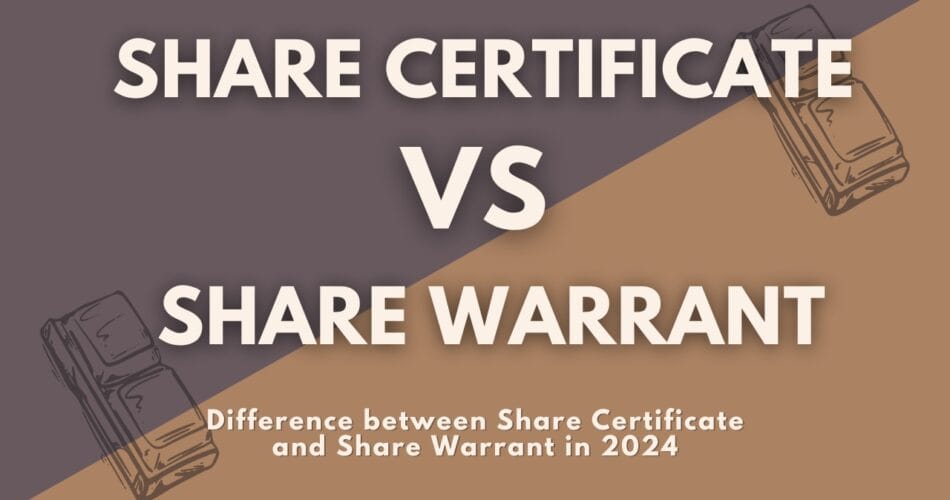Introduction
What is a Share Certificate?
A Share Certificate is a legal document issued by a company to certify that an individual or entity owns a specified number of shares in the company, serving as proof of ownership and outlining details like the shareholder’s name and the number of shares held.
What is a Share Warrant?
A Share Warrant is a financial instrument issued by a company that entitles the holder to purchase a certain number of shares at a specified price in the future. Unlike a share certificate, a share warrant does not represent ownership but grants the right to acquire shares at a later date.
Read More: What is Share Capital? Nature and Forms of Share Capital
Difference between Share Certificate and Share Warrant
1. Issue
- Share Certificate: Issued to a shareholder when they purchase shares and become a legal owner.
- Share Warrant: Issued to a person giving them the right to buy shares in the future, but it doesn’t make them a shareholder until exercised.
2. Conditions of Issue
- Share Certificate: Issued directly after shares are purchased, with no special conditions.
- Share Warrant: Issued under specific conditions, typically when a company seeks to raise capital, and often requires permission from authorities.
3. Transfer
- Share Certificate: Can be transferred to another person by registering the transfer with the company.
- Share Warrant: Usually transferable by simple delivery since it’s often a bearer document.
4. Qualification Shares for Directors
- Share Certificate: Owning shares through a certificate can qualify a director to hold office in a company.
- Share Warrant: Holding a share warrant does not qualify a director until the warrant is converted into shares.
5. Membership
- Share Certificate: The holder is considered a member of the company, with all shareholder rights like voting.
- Share Warrant: The holder is not a member until they use the warrant to buy shares.
6. Nature
- Share Certificate: A document proving ownership of shares.
- Share Warrant: A document providing the right to purchase shares in the future.
7. Dividend Coupon
- Share Certificate: The shareholder receives dividends automatically.
- Share Warrant: No dividend is paid until the warrant is exercised and shares are bought.
8. Payment of Dividend
- Share Certificate: Dividends are paid directly to the shareholder.
- Share Warrant: No dividends are paid to the holder of a share warrant.
9. Application for Winding Up
- Share Certificate: Shareholders can apply to wind up (close) the company if certain conditions are met.
- Share Warrant: Warrant holders cannot apply for winding up since they are not considered shareholders.
Read More: Understanding the Difference Between Equity and Preference Shares
Conclusion
In summary, the key difference between Share Certificate and Share Warrant lies in ownership and rights. A Share Certificate proves immediate ownership and membership in a company, offering shareholders voting rights and dividends. On the other hand, a Share Warrant provides the option to purchase shares in the future without conferring shareholder status until exercised. Understanding these distinctions is crucial for investors, as each instrument serves different purposes in managing investments and corporate governance. Whether you’re looking to become a direct shareholder or prefer the flexibility of warrants, knowing their benefits and limitations can help guide your financial decisions.
Read More: Meaning, Definition, Types, and Key Characteristics of Shares
FAQ’s
Can a Share Warrant be converted into a Share Certificate?
Yes, once a share warrant is exercised by purchasing the shares, it can be converted into a share certificate, granting the holder ownership rights and making them a shareholder.
Do Share Warrant holders receive dividends?
No, holders of share warrants do not receive dividends. Dividends are only paid to shareholders who hold a share certificate.
Is a Share Warrant transferable like a Share Certificate?
Yes, but unlike share certificates, which require formal registration, share warrants can typically be transferred by simple delivery, as they are often bearer documents.


[…] Read More: Difference between Share Certificate and Share Warrant in 2024 […]
[…] Read More: Difference between Share Certificate and Share Warrant […]